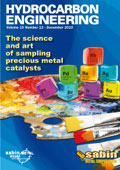Editorial comment
At the beginning of November I attended Sulphur 2010 in Prague. Whilst sulfur was of course the main topic of discussion, the problems of an ageing workforce and lack of new engineering graduates were mentioned numerous times by both speakers and delegates. The recruitment challenge has been plaguing the oil and gas industry for several years and the question of how long this will continue remains. Will the industry be left with a gap in expertise?
Register for free »
Get started now for absolutely FREE, no credit card required.
Human resources are important to all facets of the oil and gas industry and the anxieties surrounding workforces were recently noted in the OPEC World Oil Outlook 2010 as it stated that ‘the industry continues to be concerned about the availability of suitably trained man power. It is important to remember that the training, education and retention of skilled labour is fundamental to the health of the industry’. The oil and gas industry will continue to grow and technology will need to develop at the same pace, meaning that the industry will demand more people with the correct knowledge and skill sets. However, after a boom in engineering recruitment in the 70s, oil and gas workers are heading towards retirement and a gap is appearing as graduates study more ‘glamorous’ subjects such as media and the arts.
‘The 2011 Oil and Gas Industry Hiring Outlook’ from oilcareers.com paints a slightly different picture from that of OPEC when considering the level of concern within the industry when it comes to recruitment. It reports that ‘only 15% (of employers) anticipate difficulties in hiring employees, down significantly from 26% in 2009 and 85% two years ago.’ However, the problem of an ageing workforce and the knowledge gap that is starting to appear is still a point of trepidation as the report states that ‘more than a third of the technical workforce in the oil industry is over age 50 and only 27% of the oil and gas workforce is under age 40.’ Yet, the report concludes that the oil and gas industry should look towards 2011 with ‘guarded optimism’ when it comes to employing and retaining a suitable workforce as companies begin to encourage students to study engineering with incentive programs, graduate training schemes and apprenticeships.
From what has been said in the above reports and by others within the oil and gas industry, the problems of recruitment and the challenge of avoiding a gap in expertise will continue for the medium term. However, as people begin to realise that the knowledge gap is broadening and encouragement for students to study the STEM subjects (science, technology, engineering and mathematics) continues to increase, maybe approaching 2011 with ‘guarded optimism’ is indeed the correct thing to do (when it comes to this particular subject anyway).
Looking at this issue of Hydrocarbon Engineering, Robert Orttung provides the regional report, examining Central Asia’s downstream industry and David Hayes, Contributing Editor, adds to the Asian focus with a report on the Japanese petrochemical industry. This issue also looks at downstream industry assets, other than human resources, with an article from ABB discussing the challenge of what to do with recommendations from safety reviews of existing assets on pp. 56.
As the year is now drawing to a close, all of us here at Hydrocarbon Engineering hope you have a happy festive period and a healthy new year.

